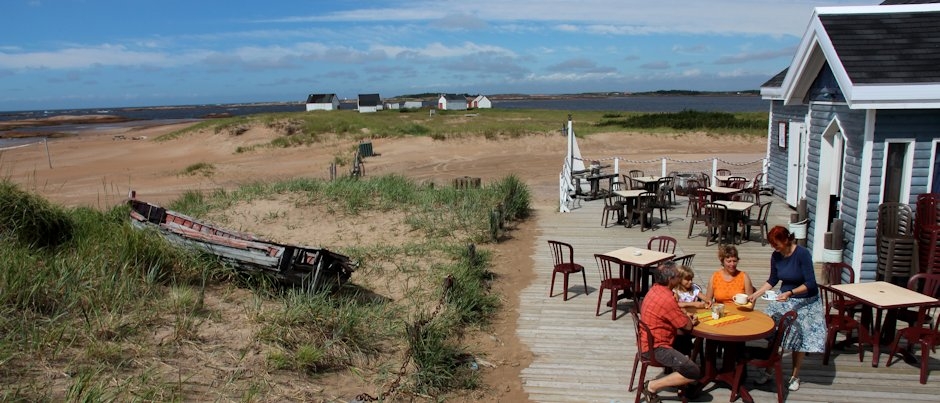The Québec maritime Blog

-
Natashquan
Éric Marchand
5 Good Reasons to Visit the Minganie Area
In Côte-Nord, Route 138 is considered an attraction in its own right. This is especially true in Minganie, an area that stretches from Rivière-au-Tonnerre to Natashquan. This segment of the Whale Route will take you from village to village all the way to the end of the road, at the edge of the Lower North Shore. Here are five good reasons to drive along Route 138 across the Minganie area!
1. Discover natural wonders in Rivière-au-Tonnerre

Rivière-au-Tonnerre (which literally means “thunder river”) owes its name to the noise of the Manitou Falls, which are located about 30 km (20 mi.) outside the village. Once you’re there, follow the walking trail to admire this 35-metre (115-foot) waterfall. In the village, be sure to visit the wooden church, which you can’t miss! Built in the Norman style at the turn of the 20th century by 300 volunteers, this church has an impressive 8-metre (26-foot) vault that’s decorated with hand-carved motifs.
2. Explore the Mingan Archipelago

One of the most iconic natural attractions in Côte-Nord, the Mingan Archipelago National Park Reserve was selected as one of “52 Places to Go in 2024” by the New York Times—and you’ll soon see why! To get to the islands, hop on a boat departing from Longue-Pointe-de-Mingan or Havre-Saint-Pierre. There are so many exciting things to see and do in the park reserve: hiking, sea kayaking with Noryak Aventures, sea excursions, lighthouses, bird watching (thousands of seabirds nest on the islands, including the famous Atlantic puffins) and more. The archipelago is home to a variety of natural habitats (including the shoreline, barrens, the boreal forest, a salt marsh, peat bogs and more), which contribute to the biodiversity found in the park reserve. One of the highlights of your visit will be seeing the archipelago’s unusual limestone monoliths. Discover these natural sculptures on Île Nue de Mingan as well as Quarry and Niapiskau islands—and try to find those in the shape of an owl, woman or eagle!
3. Plunge into the history of Baie-Johan-Beetz

Baie-Johan-Beetz is a village of fewer than 100 inhabitants that was named after a Belgian aristocrat. Johan Beetz was a naturalist and businessman who also studied medicine; he’s credited with saving the lives of many of the villagers during the 1918 Spanish influenza outbreak. Today, his house is a designated historic monument that serves as the village’s memory bank. Located on a rocky outcrop overlooking the Gulf of St. Lawrence at the mouth of the Piashti River, the building draws the eye with its Second Empire-style architecture and bright red roof. You can even spend the night here since the house has been turned into a lodge by the Pourvoirie Baie-Johan-Beetz outfitter. Explore the village by strolling along the boardwalks and imagine life as it was here before the road was built in 1996. As you walk, keep an eye out for the interpretive panels that share fascinating anecdotes about this charming village.
4. Visit the birthplace of Gilles Vigneault

Perhaps Minganie’s most famous native son, Gilles Vigneault is a legendary Québec poet and singer-songwriter who was born in Natashquan. His village and the whole region of Côte-Nord inspired many of his songs, which put these places on the world map. To get a feel for what Natashquan used to be like, visit the Les Galets heritage site, which is made up of small red and white wooden buildings that once stored salted cod. Take advantage of your visit to stroll along the boardwalk and bask in the sun on the exceptionally beautiful beach. And whether you’re a long-time fan or just discovering Gilles Vigneault’s songs for the first time, this is the perfect moment to listen to them!
5. Drive to the end of Route 138

How exciting is it to reach the end of the road? After driving hundreds of kilometres to Kegaska (which is about 40 km, or 25 mi., east of Natashquan), stop and admire the famous “138 FIN” sign that marks the end of this road. Capture this bittersweet moment with a photo that will remind you of your incredible trip: the amazing scenery that unfolded before your eyes and all the great people you met along the way. While Kegaska is the farthest flung destination on your road trip, your push east doesn’t have to end here: you can continue your adventure by hopping on a boat and setting off to explore the villages of the Lower North Shore all the way to Blanc-Sablon!
Does this last leg of the Whale Route appeal to the explorer in you? Find out about accommodation options in the Minganie area and be sure to visit these attractions as well as others you’ll discover along the way. You’ll find so much to see and do in the Côte-Nord region!

(0) comment